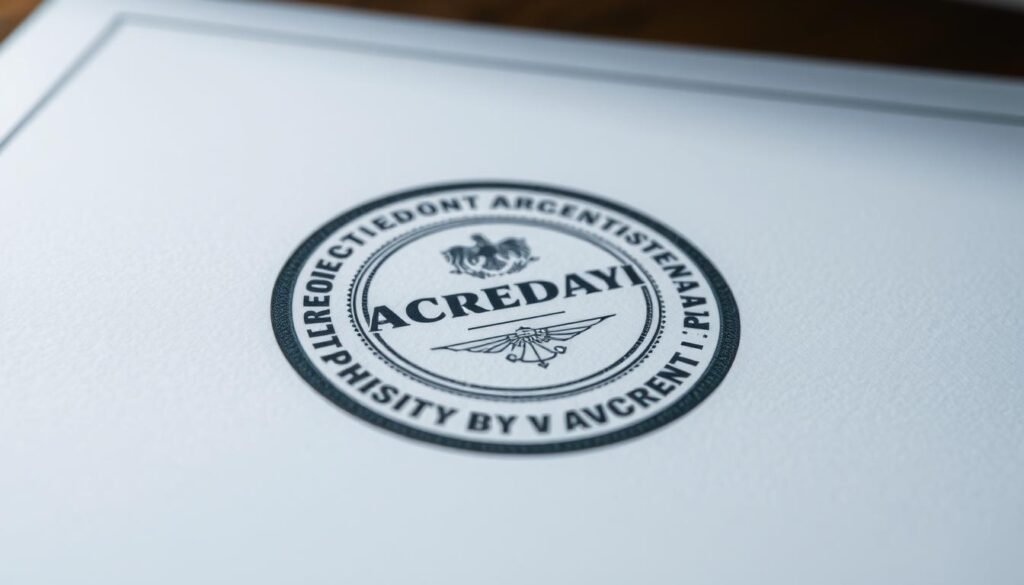Understanding higher education accreditation is key for students and schools. In the U.S., accreditation ensures education quality. This article will explore Concordia University Texas’s accreditation and its benefits.
Accreditation standards change to meet student and school needs. Concordia University Texas shows its dedication to quality education through its accreditation journey. We’ll discuss why accreditation matters in higher education and its effects on students and schools.

Introduction to Accreditation
Accreditation is crucial in higher education. It’s important for students and schools to understand its role. We’ll dive into Concordia University Texas’s accreditation status and its advantages, like easier transfer credits and better career prospects.
Key Takeaways
- Accreditation standards are essential in higher education
- Concordia University Texas has a unique accreditation journey
- Higher education accreditation impacts students and institutions
- Accreditation benefits include transfer credit advantages and career recognition
- Understanding accreditation is crucial for students and institutions
Understanding University Accreditation Basics
Academic accreditation is key to ensuring quality in higher education. In the U.S., it shows a university’s dedication to a good education. Regional accreditation and national accreditation are the main types a university can get.
What Is Academic Accreditation?
Academic accreditation is when an outside agency checks if a school meets quality standards. They look at the school’s courses, teachers, and resources.
Why Accreditation Matters in Higher Education
Accreditation is important because it makes sure a degree is respected. It also helps schools improve, giving students a better education.
Types of Accreditation in the United States
In the U.S., there are two main types: regional and national. Regional accreditation goes to non-profit schools, while national accreditation is for for-profit or specialized schools. Knowing this helps students choose the right university.
Is Concordia University Texas Accredited?
Concordia University Texas is accredited by the Southern Association of Colleges and Schools Commission on Colleges (SACSCOC). It can award associate, bachelor’s, and master’s degrees. This shows the university’s dedication to quality education that meets high standards.
The university also has specific accreditation for programs like business and nursing. This is important for ensuring these programs meet field-specific standards.
The business program at Concordia University Texas is accredited by the Accreditation Council for Business Schools and Programs (ACBSP). This means the program has met ACBSP’s strict standards. It prepares students well for their future careers.
For students thinking about Concordia University Texas, its accreditation is key. It shows the university offers a quality education recognized by employers and other schools. The focus on specific accreditation means students get training that’s right for their field.
Going to an accredited university like Concordia University Texas has many benefits. These include:
- Increased job prospects
- Improved transfer credit opportunities
- Enhanced reputation and recognition
Choosing an accredited university like Concordia University Texas means students get a top-notch education. This education prepares them for success in their careers.
The History of Concordia University Texas’s Accreditation Journey
Concordia University Texas has a long history of academic excellence. Its accreditation journey shows its dedication to quality education. From the start, the university focused on improving and meeting high standards.
This journey has allowed students to easily transfer credits to other schools. It makes Concordia a great choice for those seeking a well-rounded education.
The university’s accreditation has shaped its programs and services. It ensures students get a top education that prepares them for their careers. The ability to transfer credits helps students reach their academic goals smoothly.
Some key highlights of Concordia University Texas’s accreditation journey include:
- Early accreditation achievements, which laid the foundation for the university’s academic excellence
- Recent accreditation milestones, which demonstrate the university’s ongoing commitment to quality education
- Current accreditation status, which reflects the university’s adherence to rigorous academic standards
Understanding Concordia University Texas’s accreditation history shows its commitment to quality. This commitment has made it a respected institution. It attracts students from all over the United States.
Regional vs National Accreditation at Concordia University Texas
Institutions can get accreditation from regional or national agencies. It’s important to know the difference, especially for those looking at graduate school opportunities. Regional accreditation goes to non-profit schools that give degrees. National accreditation is for for-profit schools that focus on career training.
Regional accreditation is seen as more prestigious. This is because regional agencies have higher standards. Credits from these schools are often easier to transfer, helping students who want to go to graduate school.
Here are some key differences between regional and national accreditation:
- Regional accreditation: focuses on academic quality, has stricter standards, and is widely recognized
- National accreditation: focuses on career-based training, has less stringent standards, and may not be as widely recognized
At Concordia University Texas, knowing the difference helps students make better choices. Choosing a regionally accredited school can make it easier to move to graduate school opportunities and more.
Program-Specific Accreditations at Concordia
Concordia University Texas has many programs with special accreditations. These help graduates make a big impact in their careers. The university works hard to give students top-notch education that meets industry needs.
The programs at Concordia are approved by well-known accrediting agencies. This means students get a tough and useful education. This education helps graduates stand out in the job market.
Some of the special accreditations at Concordia University Texas include:
- Business programs accredited by the Accreditation Council for Business Schools and Programs (ACBSP)
- Nursing programs accredited by the Commission on Collegiate Nursing Education (CCNE)
- Education programs accredited by the Council for the Accreditation of Educator Preparation (CAEP)
These accreditations show Concordia’s strong focus on academic excellence. They prove the university’s commitment to giving students a solid education. This education prepares them for successful careers.
How Concordia’s Accreditation Benefits Students
Going to an accredited school like Concordia University Texas has many perks. It makes it easier to move credits to other schools. This can save students a lot of time and money, especially if they need to change schools for personal or work reasons.
Also, Concordia’s accreditation boosts graduate school opportunities for its students. Many graduate programs want applicants from accredited schools. This means Concordia’s students have a better shot at getting into top graduate programs.
Some big benefits of going to an accredited school like Concordia University Texas include:
- Increased career impact and recognition
- Improved transfer credit opportunities
- Enhanced graduate school opportunities

Overall, going to an accredited school like Concordia University Texas can really help a student’s career. It offers better transfer credits, boosts graduate school opportunities, and increases career impact. Concordia’s accreditation helps students reach their goals and do well in their careers.
Maintaining and Renewing Accreditation Standards
In higher education, keeping up with accreditation standards is ongoing. Schools must follow certain rules to keep their accredited status. This means they need to pass regular checks by accreditation agencies.
Accreditation agencies play a big role in making sure schools meet these standards. They look at things like the quality of programs, the skills of teachers, and the resources available. This helps ensure students get a good education, keeping the value of higher education high.
Some important steps for keeping up with accreditation standards include:
- Regular self-assessments and evaluations
- Improving academic programs all the time
- Helping teachers grow and succeed
- Managing resources well
By focusing on these areas, schools can make sure they meet the needed standards. This helps students and the whole academic world.
For schools, keeping up with accreditation standards is key to offering quality education. Understanding how to maintain and renew these standards helps schools navigate the complex world of higher education accreditation.
Verifying Concordia University Texas’s Accreditation Status
Understanding the difference between regional accreditation and national accreditation is key. Regional accreditation is seen as more prestigious. It comes from one of six recognized US Department of Education agencies. Concordia University Texas has both, showing its programs are top-notch.
To check the university’s accreditation, start with its official website. Look for official documentation like accreditation reports and certificates. You can also use the US Department of Education’s Database of Accredited Postsecondary Institutions and Programs. This tool confirms the university’s accreditation.
Methods for Verification
- Check the university’s official website for accreditation information
- Use online verification tools, such as the US Department of Education’s database
- Contact the university’s accreditation office directly for more information

By following these steps, you can confirm Concordia University Texas’s regional accreditation and national accreditation. This ensures a quality education. Always check an institution’s accreditation before choosing your education path.
Conclusion
Accreditation standards and program-specific accreditation are key for schools like Concordia University Texas. They help keep the school’s high standards and good name. Concordia has shown it’s serious about meeting and going beyond what accrediting bodies ask.
Knowing Concordia’s accreditation status helps students make smart choices about their education. They know they’re choosing a school that values quality and success. This accreditation also helps students get credits transferred and get into graduate school.
At Concordia University Texas, students get a top-notch education. It prepares them for the workforce. By picking Concordia, students start a journey of growth and learning. They’re supported by the school’s strong focus on academic excellence.
FAQ
What is academic accreditation?
Academic accreditation is when a school or program meets quality standards. It’s a review that checks if a school has good teachers, resources, and classes. This process is voluntary and not run by the government.
Why is accreditation important in higher education?
Accreditation is key in higher education. It makes sure schools offer quality education and meet high standards. It also helps students get federal aid and transfer credits easily.
What types of accreditation are there in the United States?
In the U.S., there are two main types of accreditation. Regional accreditation is seen as more prestigious and is given by six regional bodies. National accreditation is for vocational schools.
Is Concordia University Texas accredited?
Yes, Concordia University Texas is accredited. It has regional accreditation from the Southern Association of Colleges and Schools Commission on Colleges (SACSCOC).
What is the history of Concordia University Texas’s accreditation?
Concordia University Texas has been accredited since 1963. It has also gotten specific accreditations for its business, nursing, and education programs. This shows its dedication to quality education.
What is the difference between regional and national accreditation at Concordia University Texas?
Concordia University Texas has regional accreditation from SACSCOC. This is more prestigious than national accreditation. It’s important for students who want to transfer credits or apply to graduate programs.
What program-specific accreditations does Concordia University Texas hold?
Concordia University Texas has specific accreditations for its business, nursing, and education programs. The business program is accredited by the Accreditation Council for Business Schools and Programs (ACBSP). The nursing program is accredited by the Commission on Collegiate Nursing Education (CCNE). The education program is accredited by the Council for the Accreditation of Educator Preparation (CAEP).
How does Concordia University Texas’s accreditation benefit students?
Concordia University Texas’s accreditation helps students in many ways. It makes it easier to transfer credits, opens up more graduate school opportunities, and boosts job prospects. Employers and graduate programs often look for graduates from accredited schools.
How does Concordia University Texas maintain and renew its accreditation?
Concordia University Texas keeps its accreditation by following the standards of its accrediting bodies, like SACSCOC. It does this through self-evaluation, data collection, and regular reviews by the accrediting agencies.
How can I verify Concordia University Texas’s accreditation status?
You can check Concordia University Texas’s accreditation status in several ways. You can look at the university’s website, check the accrediting bodies’ websites, use online tools, or contact the university’s admissions office or the accrediting agencies.
